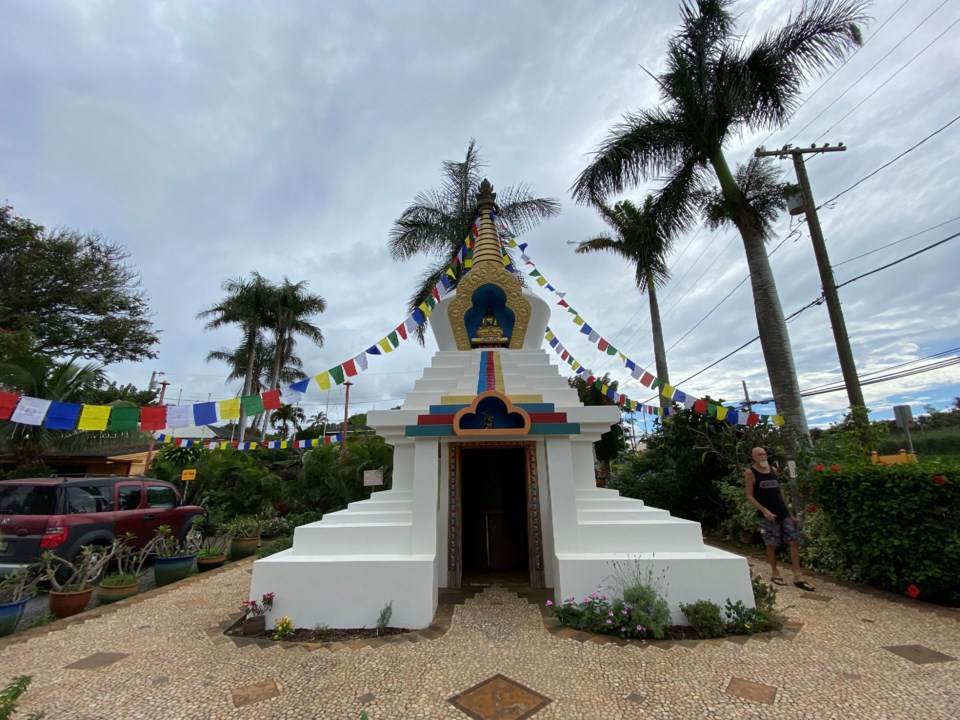I stood at the entrance of the Maui Dharma Centre in Paia, HI, reading about the circular prayer bell inside, an old man pacing laps around the temple.
“Give it a ring,” he said as he shuffled slowly, deliberately past, sizing me up through his vacant stare without stopping his prayer walk. He could have been anywhere from 45 to 70.
“It’s an auspicious day to do it.”
I wasn’t sure what he meant by that. It was the last day of January, and the first truly sunny day to hit anywhere on Maui since we had arrived a week earlier.
But I always knew I was going to ring the prayer bell.
And so I rang it, slowly and deliberately, three times before heading back out to the street where my partner was waiting.
I wanted to know more about the strange man, I said—where he’d been, and all the diverging paths that somehow brought him to this plodding, clockwise prayer march at a tiny Buddhist temple in Hawaii.
“I don’t,” was my partner’s response, followed by something about not buying into Eastern religions—or religion in general (a growing trend here in the Sea to Sky and beyond—read more in this week’s Pique cover feature).
Fair enough. Like her, I consider myself a realist—but in somewhat contradictory fashion, something of an idle dreamer, too, and every now and then, like so many countless souls before me, I feel the intoxicating pull of something much larger than myself.
Every now and then, something inside of me tells me to ring the prayer bell.
Though I was raised Catholic, these days I don’t subscribe to any one religion. Still, I’ve learned not to ignore those urges.
It was our final day in Hawaii, and the previous six did not exactly come as advertised.
Like millions of other tourists, we flew west for sun and beaches.
Maui welcomes about 275,000 people every month, and in 2021, nearly 2.3 million tourists visited the Hawaiian island.
In a state of cumulative exhaustion and grief, the winter warmth and endless crashing waves promised a much-needed reprieve for the soul.
Instead, a rare, stagnant weather pattern settled over the whole of Maui, drenching hiking trails, washing out roads and confining us, for the most part, to our third-floor condo, with little more than some Adam Sandler classics and a Harry Potter marathon on the TV to pass the time.
A flash flood warning covered the island, then hit us directly on the street outside our condo, rushing up the sides of our rented minivan and sending our windshield into a perpetual state of fog/defog.
Later we would learn that a maintenance worker was sucked into one of the drains we drove past that afternoon, and is still in critical condition after being swept out to sea.
A security guard at our complex told me he’d never seen it like this in 15 years—a sentiment repeated by a Maui longtimer from Wisconsin one night at the communal barbecues.
Then the propane ran out, and the barbecues—and communal hot tub—were roped off.
Do you ever feel like a destination wants you, specifically, to leave?
I felt, for the first time, the bitter, furious rage of a tourist scorned.
Why did we have to spend all this money to come here? Why couldn’t the weather just do what it has done for millions of other Hawaiian tourists since the advent of air travel?
Poor, hard-done-by me. World’s smallest violin.
My experience isn’t even unique. Think of all those Whistler guests who spend thousands to come ski, months in advance, having no choice but to hope it snows a decent amount beforehand and doesn’t rain or worse during their precious one-week reprieve.
Like so many other things in life, sometimes travel requires a leap of faith.
This particular excursion did not meet the lofty expectations I had set out, but it did inspire in me some more general introspection on tourism, and the broader whys underlining our great, expansive itineraries.
Why do we travel? So we can have perfect, predictable weather, unchallenging experiences, no sense of drama?
An airtight itinerary of carefully curated interactions?
Maybe, but perfect and predictable is boring, and travel is about so much more than just picking up and physically existing somewhere else for one or two weeks at a time.
At the heart of it, tourism is a personal exploration of consciousness, existence and purpose—for me, anyway.
But it can also be a fool’s errand. We can’t control the weather. We can’t predict the unpredictable, or plan every step along the journey.
After a certain point, we can only make the most of what we get, and be grateful.
Walking the Dharma Centre’s old, wooden bell inside the temple that day, the words peace and acceptance appeared, unprompted, to guide my impromptu prayer.
Peace with what is, and cannot be changed.
Acceptance of what is to come.
I said the two words silently to myself, rotating the prayer bell three times inside the temple.
Walking back onto the street, I could already feel the powerful placebo effect of my brief meditation taking hold.
And before long, the bitterness gave way to gratitude—even if Murphy’s Law wasn’t finished with our vacation yet.
Packing for the airport a few hours before our flight, I tore the zipper clear off one of our checked bags—leading to a stressful, frenzied trip to the nearest drug store for Saran wrap and duct tape, and a handwritten note pleading TSA not to tear into the now-functionally-uncloseable bag.
And somewhere in the midst of it all, my off-the-cuff prayer played its part, placing me at peace in the absurdity; accepting of yet another perfect plan gone awry.
Religious or not, my partner felt it too.
“I love this,” she remarked at some point in the ensuing chaos, referring to the chaos itself, or maybe just the unforgettable stupidity of it all.
Being in a new place, experiencing new things, and just taking everything in stride, or in this case, going with the flow of the current in the flash-flooded streets.
One last unpredictable detour to ensure we won’t forget our first trip to Maui.
I can make peace with that.





